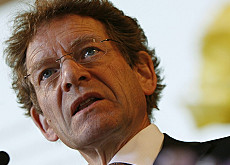
Federal institute aims to keep up the quality

Heidi Wunderli-Allenspach, the first woman rector in the 152-year history of the Federal Institute of Technology in Zurich, is determined to push standards higher.
Wunderli-Allenspach tells swissinfo about her plans to reduce the first-year drop-out rate without lowering the quality bar and to encourage more women to take up sciences.
The institute has endured a torrid eight months that included the controversial resignation of president Ernst Hafen and funding rows.
However, the appointment of a new president, Ralph Eichler, and a new budget – SFr994 million ($826 million) in 2008 compared with SFr1.2 billion this year – appear to have calmed the waters.
swissinfo: How important is it that the institute has its first female rector?
Heidi Wunderli-Allenspach: I don’t think it’s really important. It’s nice that it happened, but there was never an issue that we must now have a woman on the board. I really appreciated that because it would not have been a very good thing.
swissinfo: But you hope to attract more women to the institute?
H.W.-A.: We have really made an effort for a long time here but you can’t make a start by just hiring faculty – you have to inform people at a very early age about how interesting it is to be in scientific research.
During our 150th anniversary celebrations we had a day for schools when we realised that the younger girls, the ten- to 12-year-olds, were the most enthusiastic in the laboratory and that they were fascinated by it all.
We have been very aware of the problem [of not enough women scientists] and have started things in the past 15 years. Wherever it is possible, women should have a fair chance, but it must also start early to stand a chance of being a real success.
swissinfo: Are you concerned by the current 30 per cent drop-out rate among first-year students?
H.W.-A.: We do not have any entrance exams, so whoever has a Matura [the Swiss matriculation certificate], in whatever subject, can enter the institute. It’s no wonder that someone who focused on music does not pass in the first round.
We have a pilot project to better inform people before they arrive. The first step is to provide advice for people who are thinking of coming and tell them about their chances of passing first-year exams. The second step is a mentoring system with professors and older students to keep an eye on them and give them feedback. The third part advises students on their career prospects.
It is an issue that bothers us – we don’t like it that 30 per cent leave. But on the other hand, if you are going to keep up the level, you cannot just be a nice guy.
swissinfo: Is all the recent turbulence now behind you?
H.W.-A.: We have a good new president who knows the institute and I am happy that we can concentrate again on our core business.
We want to try to keep the Federal Institute of Technology high up in the rankings, but if you want to change you have to analyse what is not in order. We don’t have time for reforms just for the sake of them.
swissinfo: What will be your first task in your new position?
H.W.-A.: Being responsible for academic affairs, my task is to ensure excellence in teaching and education. We must bundle our quality standards and quality control tools and see what we can use and see what is hot air. We don’t want to be bureaucratic but we want feedback on quality.
swissinfo: Will you try to attract more international students?
H.W.-A.: The institute has a long tradition of having foreigners in the faculty. It started as a federal technical university at a time when tunnels through the Alps and railroads were being built and we didn’t have the experts in Switzerland, so more than half of the faculty came from abroad.
Switzerland has an interest in taking in qualified people and getting them to stay because we cannot fill all the job positions. On the other hand, you have to be careful not to take in just anyone – we are determined to keep up the standards.
swissinfo: Can you achieve your plans with your new budget?
H.W.-A.: We should not complain too much, but on the other hand there are always new programmes and the problem lately is that there have been many programmes introduced and not that much money coming in.
Switzerland isn’t doing that badly but it has not put in that much of an increase [in funding] in the last ten years. We have to be careful with budgeting and work out what we want to implement and work out what we want to stop if we start something new.
swissinfo-interview: Matthew Allen in Zurich
Heidi Wunderli-Allenspach read biology at the natural sciences department of the Federal Institute of Technology as a student.
She worked in the United States and later for the Swiss Cancer Research Institute and the Zurich University before returning to the technology institute.
She was appointed assistant professor in 1986 and associate professor in 1992. Since 1995 she has been full professor for biopharmacy at the Institute of Pharmaceutical Sciences.
Wunderli-Allenspach replaces Konrad Osterwalder as rector on September 1 on a four-year contract.
Ernst Hafen took over as president of the Federal Institute of Technology in Zurich in December 2005 promising a series of reforms, including changes to teaching methods and forging closer links to industry.
More controversially, he wanted to abolish the position of rector and reduce the number of departments.
His plans fell foul of several department heads at the institute, leading to his resignation in November last year. Interior Minister Pascal Couchepin, whose department provides most of the institute’s funding, said at the time that he deplored the resignation.
Rector Konrad Osterwalder has taken over Hafen’s duties on a temporary basis until Ralph Eichler, who was appointed in May, takes over as president on September 1.

In compliance with the JTI standards
More: SWI swissinfo.ch certified by the Journalism Trust Initiative






































You can find an overview of ongoing debates with our journalists here . Please join us!
If you want to start a conversation about a topic raised in this article or want to report factual errors, email us at english@swissinfo.ch.